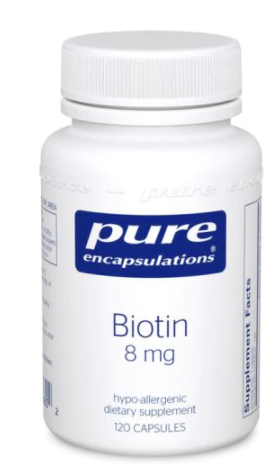Biotin is a water-soluble B vitamin that is an essential co-factor for a number of metabolic carboxylation reactions. Biotin forms a covalent bond to the following carboxylase enzymes: pyruvate carboxylase for glucose metabolism, acetyl CoA carboxylase for fatty acid oxidation, and propionyl-CoA carboxylase and β-methylcrotonyl-CoA carboxylase for amino acid metabolism. A clinical study reported that high dose administration of biotin helped promote healthy glucose metabolism. A number of animal studies support this claim. Biotin may also act to promote transcription and translation of glucokinase, an enzyme found in the liver and pancreas that participates in the metabolism of glucose to form glycogen. Studies have also indicated that biotin is supportive of nervous system health and function. A clinical study revealed that biotin promotes nerve cell health. In addition, a double-blind study reported that biotin supplementation may promote healthy lipid metabolism. Furthermore, clinical studies have indicated that biotin may adjust the cellular arrangement of the nail bed, helping to reinforce the keratin structure, promote strength and thickness, and reduce splitting. Recent studies have expanded biotin's metabolic role, claiming that the vitamin maintains healthy genetic expression of the many enzymes for which it is a cofactor. One study suggested that this gene modulation is supportive of healthy immune system function, stating that biotin may be involved in the transcription of some immune cells.

1 capsule, 1-2 times daily, with a meal.


